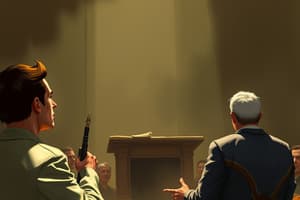Podcast
Questions and Answers
What factors are considered to determine a witness's competence in providing truthful testimony?
What factors are considered to determine a witness's competence in providing truthful testimony?
- Physical appearance and social status
- Emotional stability and past experiences
- Personal beliefs and affiliations
- Degree of expertness and mental health (correct)
Which of the following questions is NOT asked regarding secondary witnesses?
Which of the following questions is NOT asked regarding secondary witnesses?
- In what details did he accurately report the primary testimony?
- On whose primary testimony does the secondary witness base his statements?
- Did the secondary witness accurately report the primary testimony as a whole?
- Did the secondary witness verify the facts independently? (correct)
What is the general rule for establishing historical facts?
What is the general rule for establishing historical facts?
- Individual accounts are sufficient if they come from different time periods.
- Particulars must rest upon the independent testimony of two or more reliable witnesses. (correct)
- Any document can be accepted as historical evidence.
- Facts must be based on hearsay evidence to be considered valid.
What happens to hearsay evidence according to the historian's standards?
What happens to hearsay evidence according to the historian's standards?
Which of the following is true about corroboration in historical research?
Which of the following is true about corroboration in historical research?
What is the primary purpose of creating forged historical documents?
What is the primary purpose of creating forged historical documents?
What is an anachronism in the context of historical documents?
What is an anachronism in the context of historical documents?
Which method do historians use to test the authenticity of a document?
Which method do historians use to test the authenticity of a document?
In what way can forgeries of documents reveal important historical information?
In what way can forgeries of documents reveal important historical information?
What type of mistakes commonly found in forgeries can help to identify them?
What type of mistakes commonly found in forgeries can help to identify them?
What kind of analysis is used by historians to establish the credibility of a document?
What kind of analysis is used by historians to establish the credibility of a document?
What is most likely a factor that might lead to the creation of misleading documents?
What is most likely a factor that might lead to the creation of misleading documents?
What implication do misrepresentations of documents have for historians?
What implication do misrepresentations of documents have for historians?
What primarily causes errors in garbled documents?
What primarily causes errors in garbled documents?
How do historians approach the restoration of texts?
How do historians approach the restoration of texts?
What is indicated when a passage can be attributed to the author's style and contents?
What is indicated when a passage can be attributed to the author's style and contents?
What type of error is least likely to occur during the copying of documents?
What type of error is least likely to occur during the copying of documents?
Which statement best describes garbled documents?
Which statement best describes garbled documents?
What element frequently complicates textual criticism in history?
What element frequently complicates textual criticism in history?
What is a likely consequence of copyists being less careful?
What is a likely consequence of copyists being less careful?
What may indicate that certain phrases in a document are original?
What may indicate that certain phrases in a document are original?
What is essential for establishing the authenticity of a historical document?
What is essential for establishing the authenticity of a historical document?
What is the primary focus of internal criticism in historical analysis?
What is the primary focus of internal criticism in historical analysis?
Which of the following best describes a historical 'fact'?
Which of the following best describes a historical 'fact'?
What is one of the four tests for establishing the credibility of a primary witness?
What is one of the four tests for establishing the credibility of a primary witness?
What does the problem of credibility primarily examine?
What does the problem of credibility primarily examine?
Which of these factors is NOT part of the four tests to assess the credibility of testimony?
Which of these factors is NOT part of the four tests to assess the credibility of testimony?
Why might doubt about historical particulars arise, according to the content?
Why might doubt about historical particulars arise, according to the content?
What is one reason witnesses may not be equally competent as sources of historical evidence?
What is one reason witnesses may not be equally competent as sources of historical evidence?
Flashcards are hidden until you start studying
Study Notes
Competence and Reliability of Witnesses
- The competence of a primary witness is assessed based on their expertise, mental and physical health, age, education, memory, and narrative skill.
- Suspicions can arise regarding a witness's ability to estimate numbers accurately.
Hearsay and Secondary Evidence
- Historians critically evaluate secondary witnesses and their primary sources by addressing three key questions about testimony and accuracy.
- Hearsay is generally discarded as it cannot substantiate accurate reporting of primary testimony.
- Corroboration is accepted when evidence is supported by two or more reliable witnesses.
External Criticism (Authenticity)
- Forged documents can mislead historians and are created for various motives, including false claims and political propaganda.
- Anachronisms (elements belonging to different time periods) can indicate a document's authenticity.
- Experts can identify forgeries through inconsistencies in spelling, grammar, or references to events and locations.
Analysis Techniques
- Historians apply external and internal criticisms, focusing on content and context to assess credibility.
- Distinctions between authentic and garbled documents are made based on intent and error in copying.
- Textual restoration involves comparing multiple copies to determine original content, crucial for authenticating documents.
Author and Date Identification
- Identifying a document's author and approximate date is essential for external criticism.
- Authentication relies on recognizing potential anachronisms and evaluating the author’s context and intended message.
Internal Criticism (Credibility)
- The credibility of historical facts relies on the examination of eyewitness sources and the scrutiny of available documents.
- A credible historical "fact" emerges from rigorous testing according to historical methodologies.
- Even seemingly straightforward claims can be contested based on underlying testimonies.
Tests of Credibility
- Four tests are established for judging the credibility of a witness:
- Was the witness able to tell the truth?
- Was the witness willing to tell the truth?
- Was the witness accurately represented in the details under consideration?
- Is there independent corroboration for the evidence?
- Any detail that successfully passes all four tests qualifies as credible historical evidence.
Background of Witnesses
- Witnesses, despite proximity to events, vary widely in competency and reliability based on individual attributes and circumstances.
Studying That Suits You
Use AI to generate personalized quizzes and flashcards to suit your learning preferences.




